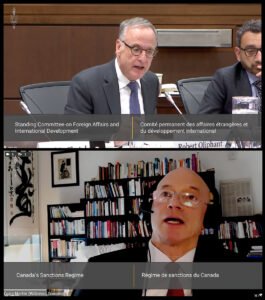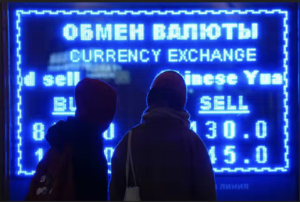 I have launched a new substack, entitled Law in Crisis, which some might find interesting. As the masthead explains, it is a forum for “musings on how law can help our response to crises, and how to respond to the crisis in law itself – use of force and armed conflict, climate change and security, AI and security, constitutional and int’l human rights, and the rule of law more generally.” The plan is to publish an essay of between one to two thousand words at least once a week.
I have launched a new substack, entitled Law in Crisis, which some might find interesting. As the masthead explains, it is a forum for “musings on how law can help our response to crises, and how to respond to the crisis in law itself – use of force and armed conflict, climate change and security, AI and security, constitutional and int’l human rights, and the rule of law more generally.” The plan is to publish an essay of between one to two thousand words at least once a week.
Economic Sanctions
Testifying on Economic Sanctions in the House of Commons, Standing Committee on Foreign Affairs
 It was an honor to invited to testify before the Standing Committee on Foreign Affairs and International Development in the Parliament of Canada’s House of Commons, on September 27, 2023, on issues relating to Canada’s economic sanctions laws, but I confess that the format was less than ideal. With each member of the committee allotted as little as five minutes for a question and an answer, it was really impossible to delve into the complexities of the issues being addressed, which was a real shame. My testimony was based on my report for policy makers on Economic Sanctions Under International Law, which was published in 2021.
It was an honor to invited to testify before the Standing Committee on Foreign Affairs and International Development in the Parliament of Canada’s House of Commons, on September 27, 2023, on issues relating to Canada’s economic sanctions laws, but I confess that the format was less than ideal. With each member of the committee allotted as little as five minutes for a question and an answer, it was really impossible to delve into the complexities of the issues being addressed, which was a real shame. My testimony was based on my report for policy makers on Economic Sanctions Under International Law, which was published in 2021.
Why Canada Should Rethink its Approach to Economic Sanctions
(Published in The Conversation, Mar. 6, 2022)
 Western countries have imposed massive sanctions against Russia for its invasion of Ukraine. The West has increasingly relied on economic sanctions to punish or change the policies of foreign governments in the last several decades. The conventional wisdom is that economic sanctions are an effective and peaceful foreign policy tool.
Western countries have imposed massive sanctions against Russia for its invasion of Ukraine. The West has increasingly relied on economic sanctions to punish or change the policies of foreign governments in the last several decades. The conventional wisdom is that economic sanctions are an effective and peaceful foreign policy tool.
Some sanctions regimes, such as the current effort against Russia, may be both effective and lawful. But as I explored in a recent research report, some economic sanctions may violate international law principles, including those the sanctions are intended to enforce. They may therefore undermine the very legal regimes that Canadians like to champion.
The nature of economic sanctions
Many economic sanctions are authorized by the United Nations Security Council or regional organizations. But countries are increasingly imposing sanctions without such legal authority. It’s these so-called unilateral or autonomous sanctions that raise legal questions.
